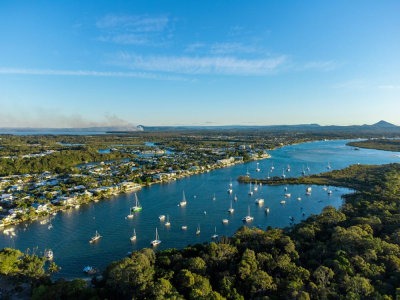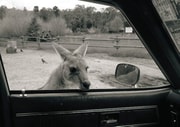Could a new tax hurt the tourism of this popular spot? Experts weigh in
By
Maan
- Replies 10
The tourism industry in Queensland has long been a major contributor to the state’s economy, but recent discussions have sparked a heated debate.
A proposed measure, aimed at addressing growing pressures, could reshape the way tourists experience the region.
However, not everyone agrees on whether the change would be beneficial or detrimental to the local scene.
Morgan Wulff, a Canadian backpacker, embarked on the adventure of a lifetime by swapping the snowy landscapes of his homeland for the tropical warmth of Far North Queensland.
The 23-year-old was one of over 200,000 visitors who arrived in Australia on a working holiday visa that year.
Mr Wulff landed in Cairns just as the region’s tourism sector entered its quietest period of the year.
On 21 January, as he took his first stroll through Cairns' CBD, hundreds of tourism operators and industry leaders gathered nearby.
Tourism Tropical North Queensland's CEO, Mark Olsen, was present at the meeting, where discussions revolved around boosting the number of visitors over the next two decades.
One key proposal was the introduction of a visitor levy to fund infrastructure projects aimed at managing the growing number of tourists expected in the state.
Mr Olsen noted that 'over 340 cities in 100 countries around the world have put in forms of levies, so we are open to the opportunity'.
Cairns Mayor Amy Eden supported the idea, suggesting that a levy of about 2.5 per cent could generate up to $19 million for her council alone, easing the burden on locals who helped fund tourism infrastructure.
Although a visitor levy, often called a ‘bed tax’ because it would be collected via small surcharges on accommodation bills, was popular with many Queensland councils in 2022, it had yet to be implemented.
Some areas, like the Gold Coast, already raised funds for tourism marketing through special business charges on rates notices.
However, the introduction of an accommodation levy would require legislative reform.
Mr Wulff, who hails from near the Canadian resort town of Banff, where visitors pay an entry fee, said he understood why Australians might support the idea of a tourist tax.
'But as a traveller myself, who is not going to be here permanently, I wouldn’t support it,' he said.
'If it was five bucks, yeah, wouldn’t sweat it. If I’m getting taxed just to be here, then, no thanks.'
Tourists Olivia Leisenberg, 20, from Germany, and Leonie Bruhin, 24, from Switzerland, also weighed in on the issue.
Ms Bruhin, who had paid similar levies in Europe, questioned whether the funds raised were used wisely.
Her friend, Ms Leisenberg, said a tourist tax wouldn’t stop her from visiting Australia, but it might affect her choice of regions or cities.
'Australia is an expensive country, I would say, for backpackers,' she commented.
Tourism Minister Andrew Powell confirmed that the bed tax idea was 'not off the books'.
'At this stage, I am supporting the conversation being had around it,' he said.
While some councils supported the levy, others were firmly against it.
The decision on the levy’s future depended on consultations regarding the Queensland government's new 20-year tourism strategy, Destination 2045.
International destinations like Venice had already introduced similar levies to manage over-tourism, with some, like Venice, still seeing an increase in visitors despite the tax.
Mr Olsen, representing the region’s tourism body, pointed to the example of an environmental management charge on Great Barrier Reef tickets.
He explained that a small charge of about $7.80 had not impacted the number of visitors to the reef.
Instead, perceptions about coral bleaching and climate change were more significant factors in influencing visitation.
Brian Hennessy, international sales manager at Sunlover Reef Cruises, confirmed broad regional support for a visitor levy.
'I did about 25 weeks outside Australia last year promoting this region and the vast majority of destinations that I travelled to charge some sort of infrastructure tax, bed tax, whatever you want to call it,' he said.
Cairns MP and opposition tourism spokesman Michael Healy was keen on seeing the levy introduced, but only if the funds stayed within the region.
'The money needs to go back to the regional council, not down to Brisbane, where if it did, I suspect we’d be going cap in hand back down there,' he said.

Would you support a levy if it meant preserving the local environment? Share your thoughts in the comments below!
A proposed measure, aimed at addressing growing pressures, could reshape the way tourists experience the region.
However, not everyone agrees on whether the change would be beneficial or detrimental to the local scene.
Morgan Wulff, a Canadian backpacker, embarked on the adventure of a lifetime by swapping the snowy landscapes of his homeland for the tropical warmth of Far North Queensland.
The 23-year-old was one of over 200,000 visitors who arrived in Australia on a working holiday visa that year.
Mr Wulff landed in Cairns just as the region’s tourism sector entered its quietest period of the year.
On 21 January, as he took his first stroll through Cairns' CBD, hundreds of tourism operators and industry leaders gathered nearby.
Tourism Tropical North Queensland's CEO, Mark Olsen, was present at the meeting, where discussions revolved around boosting the number of visitors over the next two decades.
One key proposal was the introduction of a visitor levy to fund infrastructure projects aimed at managing the growing number of tourists expected in the state.
Mr Olsen noted that 'over 340 cities in 100 countries around the world have put in forms of levies, so we are open to the opportunity'.
Cairns Mayor Amy Eden supported the idea, suggesting that a levy of about 2.5 per cent could generate up to $19 million for her council alone, easing the burden on locals who helped fund tourism infrastructure.
Although a visitor levy, often called a ‘bed tax’ because it would be collected via small surcharges on accommodation bills, was popular with many Queensland councils in 2022, it had yet to be implemented.
Some areas, like the Gold Coast, already raised funds for tourism marketing through special business charges on rates notices.
However, the introduction of an accommodation levy would require legislative reform.
Mr Wulff, who hails from near the Canadian resort town of Banff, where visitors pay an entry fee, said he understood why Australians might support the idea of a tourist tax.
'But as a traveller myself, who is not going to be here permanently, I wouldn’t support it,' he said.
'If it was five bucks, yeah, wouldn’t sweat it. If I’m getting taxed just to be here, then, no thanks.'
Tourists Olivia Leisenberg, 20, from Germany, and Leonie Bruhin, 24, from Switzerland, also weighed in on the issue.
Ms Bruhin, who had paid similar levies in Europe, questioned whether the funds raised were used wisely.
Her friend, Ms Leisenberg, said a tourist tax wouldn’t stop her from visiting Australia, but it might affect her choice of regions or cities.
'Australia is an expensive country, I would say, for backpackers,' she commented.
Tourism Minister Andrew Powell confirmed that the bed tax idea was 'not off the books'.
'At this stage, I am supporting the conversation being had around it,' he said.
While some councils supported the levy, others were firmly against it.
The decision on the levy’s future depended on consultations regarding the Queensland government's new 20-year tourism strategy, Destination 2045.
International destinations like Venice had already introduced similar levies to manage over-tourism, with some, like Venice, still seeing an increase in visitors despite the tax.
Mr Olsen, representing the region’s tourism body, pointed to the example of an environmental management charge on Great Barrier Reef tickets.
He explained that a small charge of about $7.80 had not impacted the number of visitors to the reef.
Instead, perceptions about coral bleaching and climate change were more significant factors in influencing visitation.
Brian Hennessy, international sales manager at Sunlover Reef Cruises, confirmed broad regional support for a visitor levy.
'I did about 25 weeks outside Australia last year promoting this region and the vast majority of destinations that I travelled to charge some sort of infrastructure tax, bed tax, whatever you want to call it,' he said.
Cairns MP and opposition tourism spokesman Michael Healy was keen on seeing the levy introduced, but only if the funds stayed within the region.
'The money needs to go back to the regional council, not down to Brisbane, where if it did, I suspect we’d be going cap in hand back down there,' he said.
Key Takeaways
- The tourism industry in Queensland is considering a visitor levy to fund infrastructure needs, as discussions around the proposal have sparked both support and concern.
- Cairns' tourism sector, facing its quietest period, has seen local leaders, like Tourism Tropical North Queensland's CEO, Mark Olsen, discussing ways to increase visitor numbers in the coming years.
- Some tourists, like Canadian backpacker Morgan Wulff, have expressed concerns about the tax, while others, such as Olivia Leisenberg and Leonie Bruhin, have mixed opinions on whether it would influence their travel decisions.
- The levy proposal is still under review, with opinions split on its potential effectiveness, and the decision will depend on consultations related to Queensland’s Destination 2045 strategy.
Would you support a levy if it meant preserving the local environment? Share your thoughts in the comments below!








